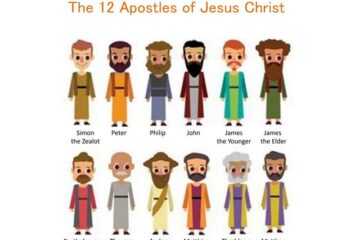What is the Holy Spirit? Who is He? What is His purpose? What is baptism, the indwelling and empowering of the Holy Spirit? What is the Holy Spirit’s relationship to the world and to Christians? There is a lot of confusion about the Holy Spirit. Many honest and devout Christians have some strange ideas about the character of the Holy Spirit and how He works in their lives and the world. There is a lot of man-made material on the topic and the scriptures reveal all we need to know about the Holy Spirit, but it does not reveal everything we may want to know. Human understanding on this topic will always be left ‘wanting’. Nevertheless, this paper attempts to provide some perspective on the topic.
The Holy Spirit is an equal part of the triune godhead. He is a person in equal character to God and Jesus. He was in the beginning when God said, “Let Us…” and He will be with us until the end of the age. The Holy Spirit is not an “it” or a “thing”, He is a person with a unique personality (Joh. 16:13-14), attributes and characteristics. He is the Spirit of God. It is important to state here that the hierarchical nature of human social development is a convenience provided to us by God but does not apply to Him or the godhead. Therefore, we must resist the temptation to put any of the godhead into a proverbial box convenient to our understanding. The Holy Spirit is equal in every way to the Father and the Son. To understand the Holy Spirit to the degree that we can, we must rely on the power He provides through understanding of the inspire word of God (2Ti. 3:16-17).
The Holy Spirit is a person. He is referred to in the scriptures nine times as a ‘person’. “He is life, thought, volition, action, speech, individuality, character and influence (Rogers).” He Speaks (1Ti. 4:1, ref. Act. 20:29-30), Witnesses (Joh. 15:26, Heb. 10:15-17), Teaches (Joh. 14:26, Luk. 12:12), Guides (Joh. 16:13), Intercedes (Rom. 8:26-27), Leads and Forbids (Act. 16:6-10). He possesses Mind (Rom. 8:27), Knowledge (1Co. 2:11), Affections (Rom. 15:30) and a Will (1Co. 12:11). In defining the character of the Holy Spirit, He is an entity possessing intelligence and emotions. For example, He can be grieved (Eph. 4:30 compare Isa. 63:10), He can be Resisted (Act. 5:3) and He can be insulted or Blasphemed (Mat. 12:32). Only a ‘person’ can be treated in this manner. The Holy Spirit is Eternal (Heb. 9:14), Omniscient (1Co. 2:10), Omnipotent (Mic. 3:8) and He is Omnipresent (Psa. 139:7-10). The Holy Spirit created the universe (Psa. 104:30), regenerates Man (Joh. 3:5) and will Resurrect the body (Rom. 8:11). He also performed Miracles (1Co. 12:4-11). The Holy Spirit is a unique Person of Deity, He is God.
So if the Holy Spirit is God yet separate and apart from God the Father and God the Son, what is the purpose of the Holy Spirit both locally and from a worldview perspective?
The primary purpose or concern of the Holy Spirit is to bring man to God and to reveal God to man. The Holy Spirit is the author of the Word of Life, the Sacred Scriptures, and God’s unerring revelation to man. God has revealed Himself to man in many ways both directly and indirectly. How this is accomplished, in part, requires one to understand the difference between Revelation and Inspiration.
Revelation is the action of God that enables man to know the unknowable (i.e. what he cannot discern through his own senses and abilities). Inspiration is that action of God upon man that enables him to record this revelation, without error, for the good of mankind. The word “inspiration” from the original Greek literally means “God-breathed.” Prophecy is revealed by inspiration from the Holy Spirit (2Pe. 1:21). Other examples of revelation in prophecy include Moses (Num. 11:25ff), David (2Sa. 23:2, Paul (Act 28:25) and others. The Spirits inspirational influence is claimed by many in both the Old and New Testaments. Some have suggested that the Holy Spirit and the Word of God are the same things. They are not. Eph. 6:17 demonstrates that the Spirit and the Word are no more the same than the Soldier and his Sword. The Holy Spirit of God is the author of Life. He is the author of the Word of Life, which is the “power of God unto salvation unto everyone who believes” (Rom. 1:16). So it can be concluded that at least one of the purposes of the Holy Spirit is that He has been actively involved from the beginning, His influence manifests itself in various ways, and He is the author of the mind of God the Father.
Before going into the question of baptism as a product of this paper, a clarification of the relationship between Father, Son and Holy Spirit is appropriate. The Spirit of the Father is also the Spirit of Christ or the Son. The relationship of the Father to the Spirit has been briefly covered, in part, in the discussion of prophecy, inspiration, revelation and how the inspired writings were created. There is much more to the Father/Spirit relationship too extensive to cover in this paper. However, the scriptures reveal a clear and detailed relationship between the work of the Son and the Spirit. Jesus could not have accomplished the redemption plan without the Holy Spirit. Jesus, as fully God (Joh. 1:1; Heb. 1:8; Php. 2:5-6) as well as having been fully Man, making Him unique, has all the same deist-attributes as God the Father and the Holy Spirit e.g. Omnipotence, Omnipresence and Omniscience. The Holy Spirit authored all the prophecies concerning Jesus’ coming, His ministry and his death, burial, and resurrection. The Spirit’s work in the life of Christ cannot be understated. It was the Spirit that enabled some of the miracles that Jesus performed such as driving out the demon in the blind and dumb man in Mat. 12. This is not to say that Jesus was in any way deficient as He was God himself, but in human form, He needed the Holy Spirit as much as we need Him today, perhaps even more. The roles of each the Father, Son and Holy Spirit are different, and the unique role of the Son is a good Segway into the discussion on Baptism.
There is a lot of confusion around baptism. There is the work or activity of baptism as practiced today and as commanded in scripture for the remission of sins (Act. 2:38) but there is also the baptism of the Holy Spirit or the Spirit being ‘poured’ out. There is the ‘indwelling’ of the Spirit and empowering by the Spirit. What are the relationships between these different terms?
The promise in Acts 1:5b is where some of the confusion begins. This promise of Jesus to the apostles that they would be “Baptized with the Holy Spirit” is a passage of much debate. However, when taken in its context and compared with the activities in Acts 2, we can begin to see some distinctions. It must be established as to whether baptism with the Holy Spirit was a local event or one that is ongoing even until this day. Secondly, it must be compared to the baptism of John versus the baptism of salvation e.g. in the name of Jesus Christ. An extended exegetical and hermeneutical analysis of baptism is beyond the scope of this document. Summarizing however, John the Baptist’s baptism was simply one of repentance and ceased to be relevant once Jesus was resurrected and the church established on Pentacost. The baptism mentioned in Acts 1, baptism of the Holy Spirit was a localized event based on several forensically related passages. It was a promise by Jesus made to the apostles before His ascension. The context is that from a timing perspective, it would very soon (v5 – “not many days from now”), it had the specific purpose of bringing into their memory all that he had taught them, and unbeknownst to them at the time, empower them with spiritual gifts and miraculous powers. The apostles were given miraculous powers for the purpose of confirming the gospel message of Christ. The outpouring of the Spirit that occurs in Acts 2 was also a one-time event for all mankind. The purpose of which was to provide a counselor and one who would reside with the souls of Christians for the purposes of guiding them in God’s purposes for their lives, through the end of time. The decision of how and what gifts or powers were to be given was solely determined by the Holy Spirit. The terms ‘baptizing in the Spirit’ in Acts 1 and the ‘Outpouring of the Spirit’ in Acts 2 are referring to the same event, just in two different ways. Jesus poured out the Spirit for all mankind and gave the Spirit to all Christians who obeyed the gospel of Christ. The Spirit then gave power to as many as He saw fit. To the apostles He gave miraculous powers as to them now were committed the oracles of God (Rom. 3:2; Heb. 5:12; 1Pe. 4:11) within the context of the new covenant. To prove the Gentiles were included in the promise, He gave some (like Cornelius in Acts 10) the gift of tongues.
There was always a specific purpose to how the Holy Spirit influenced events, it was not a free-for-all with miraculous and non-miraculous powers being given to any and everyone. The purpose of the miraculous was to prove whatever was being spoken or done in the establishment of the church. The church has been well established now and there is no need for the miraculous any longer. People often confuse miraculous with providence, not truly knowing or understanding the definition of either. The non-miraculous is what we have today for the written Word of God has been confirmed. His perfect plan well implemented, and His providence is managing everything towards that plan. We must keep in perspective the distinction between the ‘Spirit as a gift’ and ‘gifts from the Spirit’.
The baptism in water as commanded in (Mat. 28:19; Act. 2:38, 2:41; 8:36-39, 22:16; Rom. 6:4ff, 10:9-14; 1Pe. 3:21; Mar. 16:15-16) is for the ‘remission of sins’ (Acts 2:38) and prepares one’s soul for the work of the Spirit. It is not optional as some suppose. It is also not simply symbolic as Calvinist contend but is a required element within the salvation process. Many arguments have been made about and between faith, belief and baptism as to what is required and what saves man. The fact is they all are required! Baptism is specifically called for and its purpose clearly ennumerated, as are faith, belief and repentance as well. The nature of baptism is in the form of an immersion in water as the original Greek word ‘baptizo’ literally means to submerge or immerse. This makes human inventions around baptism in sprinkling and pouring scripturally invalid. Only at this point is a person eligible to receive the gift of the Holy Spirit to ‘indwell’ them. The Spirit does not indwell a sinner. The indwelling of the Spirit is the sign upon our souls that God gives to His children that declares them as His. There is a circumcision of the heart (Rom 2:29; Php. 3:3; Col. 2:11) that takes place during baptism by water that identifies a person as one of His. It is the indwelling of the Holy Spirit that removes the chasm between God the Father and the individual person due to the persons sin and sinful nature. The Spirit performs the work of intercession for us while Christ both intercedes and mediates (1Ti. 2:5-6). There is more though as we will see that the Holy Spirit plays an active role in the everyday life of the Christian.
Christian’s are empowered by the indwelling of the Holy Spirit to first, understand God’s word more inductively. This means that there is a greater ability of a person to understand some of the mysteries surrounding scripture that would forever be hidden to the non-Christian. There is no code talk here and it is not about the concept of ‘illumination’, just the fact that God’s word can never be spiritually understood by someone who is not a child of God (1Co. 1:18; 2Co. 2:15, 4:3; 2Th. 2:10). Understanding the Bible requires more than just intellect and reading comprehension, it requires spiritual comprehension as well (Rom. 12:1). The indwelled Spirit empowers an ability of spiritual discernment which gives us a view into life and holiness (Psa. 29:2; Lk. 1:75; 1Th. 3:13; Heb. 12:14; 2Pe. 3:11) unavailable to non-believers. This is for us to continually grow towards Him by having the scriptures against which we measure ourselves (Jam. 1) as well as to discern the true motives of those who are enemies of Christ (Php. 3:18; Phi. 1:15-16; 1Co. 1:18; Gal. 1:7, 2:21, 6:12). The Holy Spirit gives us the power to faithfully endure suffrage for the purpose of strengthening our faith and glorifying the Father (Rom 5:3; 2Th. 1:5; 2Ti. 1:8, 2:3, 4:5; 1Pe. 5:9). The Spirit is ever-present in our walk with Christ by enabling opportunities to glorify the Father as representatives of the Son. Through the Holy Spirit, God’s providence is manifested, and His plan continually implemented. “In summary we might say that the Holy Spirit of God does the following things for us:
1. He strengthens us with power in our inner man – Ephesians 3:16.
2. He enables Christ to dwell in our hearts by faith – Ephesians 3:17.
3. He yearns for us and gives us the greater grace – James 4:5-6.
4. He helps our infirmities and intercedes for us – Romans 8:26-27.
5. He helps us in overcoming sin – Romans 8:13; Galatians 5:16-17.
6. He makes us free from law and legalism as a system – Galatians 5:18.
7. He enables us to live in unity with our brethren – Galatians 5:25.
8. He enables us to bear fruit – Galatians 5:22.
9. He transforms our characters into God’s likeness – 2 Corinthians 3:17-18.
10. He enables us to live in an atmosphere of holiness – Romans 14:17”. (Rogers)
As all the questions proposed at the beginning of this paper have thus far been answered, the last question to answer is what the Holy Spirit is not and what does He not do in the life of the Christian and in the world.
The Holy Spirit is not a voice you hear in the middle of the night. He does not speak to you through social media, the television or radio. He is not someone that forces anyone to do anything. He does not remove free-will. He is not some mystical influence like the “force” in Star Wars that manipulates people’s minds into obedience. He does not ‘illuminate’ a person’s comprehension of scripture as though giving an individual a personal revelation (2Pe. 1:21). If He did, what happens when two people come to different ‘understandings’ about any given passage of scripture, and they both presumably have the indwelling of the Spirit?!
God insured that His word was written down and now this word makes us complete (2Ti. 3:16-17). The Word of God is powerful enough (Heb. 4:12) to give us all that we need in every area of life (2Pe. 1:3). We can be led by the Spirit through the
word of God or we can be led by fleshly desires.
Rom 8:13 “For if you live according to the flesh you will die, but if by the Spirit you put to death the deeds of the body, you will live.14 For all who are led by the Spirit of God are sons of God.”
References
Rogers, Richard. The Holy Spirit of God. Lubbock: Sunset Institute Press, 2007.


